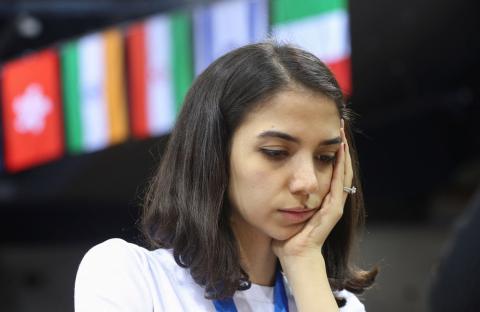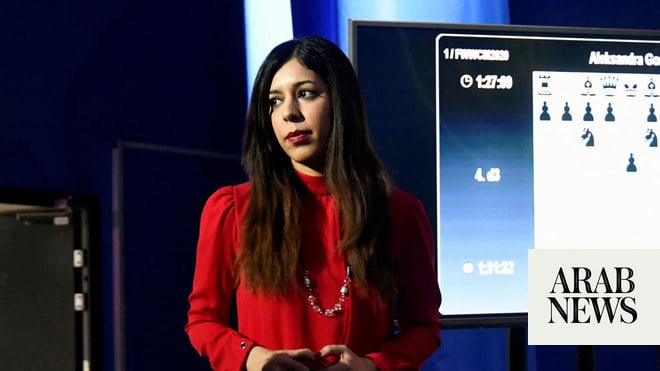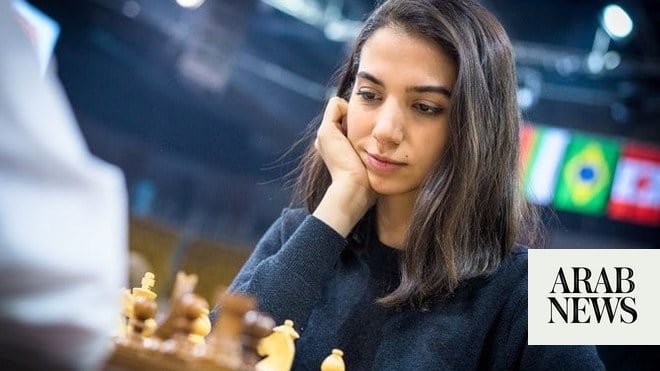
Shohreh Bayat was condemned by Iranian media and came under pressure from Iran"s chess federation
Shohreh Bayat talks about her experience at women’s world championships in Shanghai
LONDON: When 32-year-old chess referee Shohreh Bayat was selected to be the chief arbiter at the women’s world championships in Shanghai, she doubtless expected it to be a career highlight. But as an Iranian woman with a liberal streak, it changed her life forever.
In line with common Iranian custom, Bayat wore her hijab loosely at the tournament.
But the president of the Iranian Chess Federation demanded that she adjust her headscarf to cover more of her hair to make it more conservative.
After just one round of chess, the federation insisted that she be photographed wearing the headscarf traditionally. She refused.
Soon after, Bayat was condemned by the Iranian media after images, taken at an angle that made it seem as if she was not wearing a hijab, circulated on social media. She is adamant that she was wearing it loosely.
The federation purged her photo from social media and asked her to sign an open statement in support of the hijab. Bayat, true to her colors, rejected the statement.
By this point, her life had changed forever. Knowing that the punishment in Iran for not wearing the hijab is imprisonment, an invalidated passport and 70 lashes, she had to escape.
With the quick thinking typical of a chess player, she outmaneuvered the Iranian authorities and fled to Britain.
After landing in London, she immediately claimed asylum. She has remained here for two months, housed and fed by the chess community.
In an exclusive interview with Arab News, the referee shed light on Iran’s police state, its draconian monitoring of female athletes overseas, and the torment she has faced in her fight for freedom.
The hurt in her eyes is clear as she describes the authoritarian grip placed on the women’s chess team and its referees.
She said she had to follow the government’s instructions “because the hijab is mandatory in Iran.”
She added: “I had no option but to wear it, but I was trying to wear it in a loose way because I’m not religious, I’m a modern liberal. This is completely normal by Iranian standards.”
It might have been completely normal for Bayat and other Iranian women longing for change, but the authorities had other ideas.
“After one round, the president of the Iranian Chess Federation told me to take a good photo with my hijab fitted properly. As a protest against the practice, I wore a looser hijab,” she said.
“The next day, the Iranian media broadcast a photo of me from a different angle where you couldn’t see my headscarf. They condemned me, the federation purged my picture, and I was asked to write an open statement in support of the hijab, but I didn’t want to do that,” she added.
“The Iranian government sent a minder, in effect the religious police, to report us to the Sports Ministry and other officials to check on our hijab and to make sure that we don’t shake hands with other genders.”
Arab News asked Bayat if she felt liberated when she left Iran for chess tournaments, enjoying different cultures where religious and legal demands are less strict, but in many ways she said it was worse.
“I kept comparing myself with other women. It wasn’t easy because I didn’t have their rights.
The officials were watching me and checking my photos. Sometimes they’d send bad reports about us. It was affecting my career and my happiness,” she said.
“It’s not easy when someone is watching your behavior and reporting you. Even in other countries, we don’t feel free.”
In light of changes in the Middle East — with Saudi Arabia launching a women’s football league amid a wave of public concerts, sports events and festivals — Bayat spoke longingly for the same progress to reach Iran.
“Women in Iran are still fighting for the right to ride a bicycle, to go to a football match, or choose what they want to wear,” she said.
“Their lives are very difficult. We need to pay more attention because it’s daily harassment. I hope they’ll be free in the future.”
Bayat longs for normality and freedom for Iranian women, but she is also desperate for the opportunity to return to her family. Due to the extent of the punishment she expects from Tehran, she cannot go back home.
“According to Iranian law, the punishment for not wearing the hijab is being imprisoned, invalidating your passport and even 70 lashes,” she said.
“For me it could be even worse as they want to make an example of me because it was a high-profile event.”
This fear of extreme retribution forced her to flee, and has separated her from her family.
“I don’t feel safe to go back home. I’m married and my husband is in Iran with all my family. I miss them very much, but I’ve been able to speak with them every day via WhatsApp. We’ve tried to have some video calls. I don’t know when I’ll see them again,” she said.
“I’m worried about them. The situation in Iran is special because of coronavirus. People are staying in their homes, they don’t go outside. Everything is different, so I don’t know what to expect.”
Stuck in a country she does not call home, while her family long for her return under a tyrannical regime that could thrash and imprison her, Bayat’s future is uncertain.
Until Iran catches up with the rest of the region, her precarious position will likely continue.












